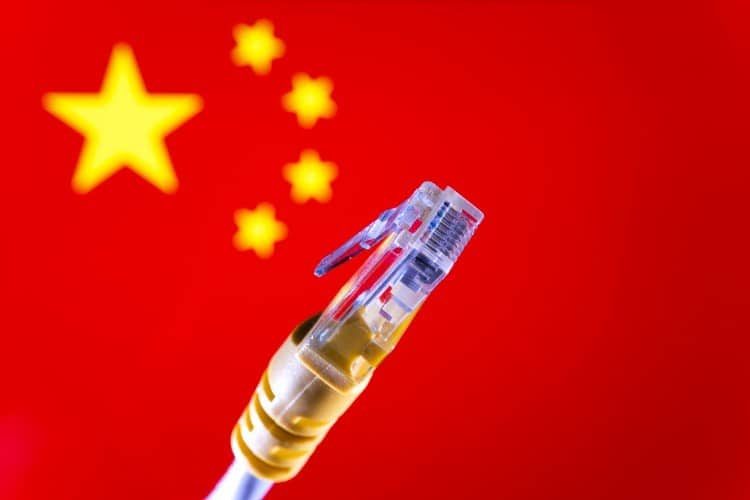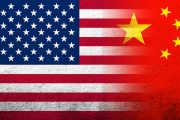
China’s internet censors eradicated on Friday, October 14 all online mentions of a protest in Beijing that featured banners criticizing Chinese President Xi Jinping as well as the country’s draconian and freedom-curtailing Covid-19 policies.
Photos and video footage of the protest were spreading online on Thursday depicting a protester on the side of Sitong bridge in Beijing with two painted banners containing slogans denouncing the Communist Party’s measures. Based on images and videos shared on China-censored Twitter, the banners also called for Xi to be ousted as well as for an end to restrictive Covid-19 policies.
“No Covid tests, I want to make a living. No Cultural Revolution, I want reforms. No lockdowns, I want freedom. No leaders, I want to vote. No lies, I want dignity. I won’t be a slave, I’ll be a citizen,” one banner read.
Other photos portrayed someone in a hard hat on a bridge behind the banners, as well as smoke rising from a fire on the bridge and police scrambling to get rid of the banners.
When AFP journalists reached the scene of the reported protest on Thursday, the protester in the aforesaid photos was nowhere to be found. Yet there seemed to be an increased police presence around the site, despite locals claiming they had not seen the banners.
Public protests are very uncommon in the Chinese capital, and those who go against Beijing’s uncompromising laws and security structure face harsh punishment. Also, the communist regime adopts a severe stance toward dissenters, such as pro-freedom and anti-communist advocate Cardinal Zen.
Chinese social-media censors had banned posts and keywords linked to the protest, including the term “Sitong Bridge.”
Moreover, only verified accounts showcased search results for the keyword “Beijing” on the popular Weibo platform on Friday, in lieu of ordinary users’ posts about the capital.
Phrases that alluded indirectly to the protest, such as the hashtag “I saw it,” completely disappeared by Friday afternoon.
“I saw it” was one of the final hashtags with which Weibo users discussed the incident in veiled references early Friday, with one user remarking: “I saw it, I will not forget it.”
Beijing is on a high security watch to curtail any obstacle to a significant Communist Party meeting that begins on Sunday, October 16. At this upcoming meeting, Xi is slated to clinch a historic third term.
All incoming parcels to the capital, along with subway commuters, have had to undergo additional security checks. Additionally, armies of volunteers have been dispatched in every neighborhood to report any suspicious activity.
Earlier this week, the Communist Party’s flagship newspaper, the People’s Daily, promoted the regime’s heavy-handed Covid Zero policy for the second day in a row, extinguishing any hope that Xi would loosen tight controls soon after the Communist Party’s congress on October 16.
Covid Zero is “sustainable” and the country must stick to the policy because it’s key to stabilizing the economy and protecting lives, the People’s Daily remarked in a commentary Tuesday.
“Only when the epidemic is under control can the economy be stable, people’s lives be peaceful, and economic and social development be stable and healthy,” Tuesday’s commentary articulated.
“A relaxation of virus prevention and control will inevitably increase the risk of infection among vulnerable people. Once a large-scale Covid rebound is formed, the spread of the epidemic will inevitably have a serious impact on economic and social development, and the final cost will be higher and the loss will be greater.”
Such comments mirror a similar article Monday labeling the freedom-restricting Covid Zero policy as “scientific and effective.”
Covid Zero, officially termed “dynamic zero clearing,” was alleged to have “balanced the relationship between epidemic prevention and control and economic and social development,” enabling China to attain the maximum effect “at the minimum cost.”
These comments also justified such strict policies on the pretext that China is a large country with a population of more than 1.4 billion, with “unbalanced regional development and insufficient medical resources.”
“It is precisely because of the dynamic zero clearing that we have ensured the extremely low morbidity, mortality and hospitalization rates, as well as the stable operation of the society and economy,” the newspaper said, opining that the existing policy is the best option for China for the moment.
Yet the newspaper also urged against “excessive epidemic prevention,” saying officials must attempt to enhance “scientific and targeted” measures while ditching the “one-size-fits-all” approach.
These editorials came amid calls from many residents, international investors, and executives for China to ditch or relax its strict Covid Zero policy. Harsh lockdowns and regular Covid testing over the past nearly three years have adversely impacted everyday lives as well as undermined the world’s second-largest economy.
For example, business center Shanghai is implementing compulsory mass-testing measures again. Under such measures, residents have to be tested at least twice weekly through early November.
To boot, travelers to Shanghai have to produce a negative Covid-19 result within 24 hours of arriving and have to do three tests in three days.
Also, some residents in the huge city of Chengdu were recently not permitted to go outside even when an earthquake rattled their apartment buildings.
Local authorities face pressure to get Covid-19 numbers under control amid the upcoming Party Congress.
For Xi, the virus curbs remain a political victory despite his grueling and privacy-invading policies causing misery among many residents in China.
His no-nonsense approach to Covid has become equated with attempts to entrench his grip on power over China and its ruling Communist Party (CCP).
“Xi’s legacy and the legitimacy of the CCP are bound to the success of the zero-Covid campaign,” Diana Fu, a specialist on Chinese domestic politics at the Brookings Institution think tank, remarked to AFP.
Despite the rest of the world regarding Covid-19 to be endemic, Xi has maintained or even intensified strict policies purportedly to get rid of the virus.
Steve Tsang, director of the SOAS China Institute at the University of London, commented that the Covid-monitoring measures were “in line with the model of social control” championed by Xi.
Before Covid-19 came along, China’s citizens were already under invasive surveillance.



